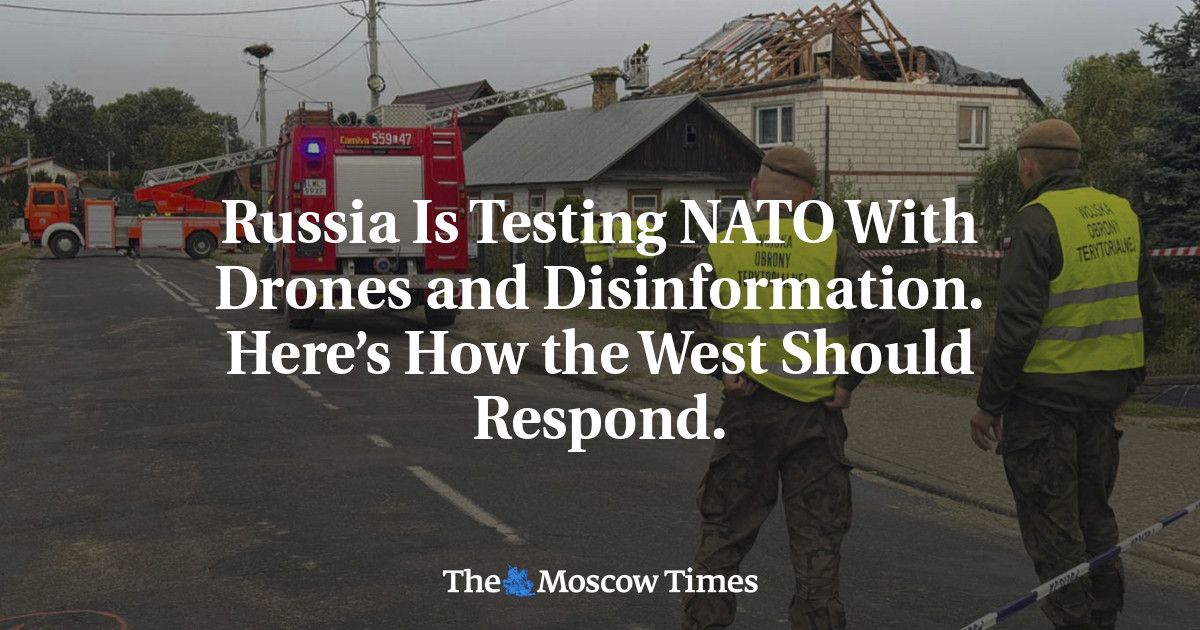
Russia Is Testing NATO With Drones and Disinformation. Here’s How the West Should Respond.
How did your country report this? Share your view in the comments.
Diverging Reports Breakdown
Russia Is Testing NATO With Drones and Disinformation. Here’s How the West Should Respond.
Russian drones violated Polish airspace on Sept. 9–10. The intrusion was accompanied by a coherent, multi-layered Russian information operation. This approach represents Moscow’s typical mode of operation, writes Andrew Hammond. Hammond: The objective is to disorient and undermine the adversary, ultimately forcing them into choices beneficial to the Kremlin. The West and Poland must not remain passive or limit themselves to ad hoc reactions, he says, and must improve resilience in both state and society and build long-term resilience in the country and society as a whole. Russia struck a sensitive nerve in Poland. It seems the aim of Moscow’s campaign was also to destroy the socio-political consensus that views Russia negatively, Hammond writes. Many people in Poland and other Central European countries are well informed about Russia and critical of the Kremlin’s policies, mainly due to negative historic experiences that linger in their national memory today, he writes. Hammond. However, the drone-political incident undoubtedly shows that pro-Russian narratives can penetrate Western debate when favorable conditions arise. Russia is capable of generating such conditions and if it does not face a decisive Western response, it will likely attempt similar provocations again.
Messages aligned with those coming from Russia aimed to amplify feelings of threat and panic, undermine trust in state institutions — the government and the army — and suggest that Poland lacks an effective military or defense. Online discussions have called for suspending cooperation with Ukraine and sometimes even, starting cooperation with the Russian aggressor, something that until recently would have been immediately condemned online. In a society that has taken in over two million Ukrainian refugees since the invasion began, an uncontrolled eruption of growing anti-Ukrainian sentiments would be a major success for the Kremlin. Taking this into account, it is important to emphasize that not every critical opinion about Ukraine or its actions stems from Russian disinformation. Some social tensions in Poland have real causes ranging from overloaded refugee support systems to growing frustrations due to the ongoing war and economic difficulties. However, Russia exploits real social problems, turning them into fertile ground for its information operations — a hallmark of Russia’s hybrid warfare strategy. This time, Russia struck a sensitive nerve in Poland. It seems the aim of Moscow’s campaign was also to destroy the socio-political consensus that views Russia negatively. From the political elite to ordinary citizens, many people in Poland and other Central European countries are well informed about Russia and critical of the Kremlin’s policies, mainly due to negative historic experiences that linger in their national memory today. Until now, one could generally argue that under these conditions, the effectiveness of Russian information operations — understood as their ability to directly influence government decisions — was limited. Politicians from both ruling and opposition parties have pursued policies the Russian propaganda has long labeled as “Russophobic.” Will the information operation accompanying the drones reverse this trend? Not necessarily. However, the drone incident undoubtedly shows that pro-Russian narratives can penetrate Western socio-political debate when favorable conditions arise. Russia is capable of generating such conditions and, if it does not face a decisive Western response, will likely attempt similar provocations again. Faced with this situation, Poland and the West cannot remain passive or limit themselves to ad hoc reactions. Concrete systemic changes are necessary to improve defense mechanisms and build long-term resilience in both the state and society. Among proactive measures, priority should be given to supporting Ukraine, which can not only effectively weaken Russia’s military potential on the battlefield but also in the country’s information space. This could force the Kremlin to confront uncomfortable topics, including past military failures such as the liberation of Kherson, Ukraine’s incursion into the Kursk region, or drone attacks on energy facilities deep inside Russia). Another obvious step on the alliance level should be strengthening military cooperation within NATO with a focus on protecting the eastern flank, following the maxim: if you want peace, prepare for war. Systematically enhancing deterrence capabilities is one of the few forms of strategic communication that reaches and is properly interpreted in the Kremlin. The decision announced by NATO Secretary General Mark Rutte on Sept. 12 to launch the Eastern Sentry initiative, which includes deploying additional NATO air assets such as French and British fighters and Czech helicopters to patrol the eastern flank, is a step in the right direction.
news Poland and Latvia Restrict Airspace Near Russian and Belarusian Borders After Drone Incursion Read more
